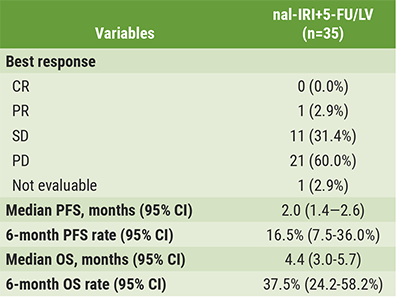Dr Osama Rahma (Dana-Farber Cancer Institute, USA) presented the first results of the pembrolizumab experimental arm of a phase 2 clinical trial (NCT02921256) using total neoadjuvant therapy in LARC [1]. Total neoadjuvant therapy is an emerging treatment option of LARC in which systemic chemotherapy is added to chemoradiotherapy in order to improve clinical outcome as currently loco-regional relapse rates are still 5-6%, and long-time survival is only 65%. Radiation therapy can lead to immunogenic cell death and tumour antigen release, associated with upregulation of immunogenic surface markers and cytokines, eventually causing expression of PD-L1 in both tumour cells and immune cells. The researchers hypothesised that this immunotherapy resistance could be overcome by combining chemoradiation and anti-PD-1 therapy, and tested novel agents in combination with neoadjuvant FOLFOX, followed by chemoradiation.
Stage 2 or stage 3 LARC patients with one or more of the following conditions were included: distal location [cT3-4 #5cm from anal verge, any N]; bulky [any cT4 or tumour within 3mm of mesorectal fascia]; high risk for metastatic disease [cN2]; or not a sphincter-sparing surgery candidate. The patients were randomised to neoadjuvant FOLFOX + chemoradiation + capecitabine ± pembrolizumab (200 mg IV every 3 weeks x 6 doses; control arm n=95; pembrolizumab arm n=90), followed by surgery 8–12 weeks after the last dose of radiotherapy. The primary endpoint was improvement in the Neoadjuvant Rectal Cancer score (NAR). Key secondary endpoints included complete response, local recurrence, disease-free and overall survival, and toxicity.
The primary endpoint was not met; mean NAR score was 14.08 in the control arm versus 11.53 for the pembrolizumab arm (P=0.26). None of the secondary endpoints reached significance either. The side effects observed with additional pembrolizumab therapy were consistent with both chemoradiotherapy and pembrolizumab safety profile. Grade 3/4 adverse events were slightly increased on the pembrolizumab arm during and after chemoradiotherapy (48.2 vs 37.3%). There were 2 deaths during FOLFOX, one on the control arm due to sepsis, the other on the treatment arm due to pneumonia.
In summary, the additional treatment with pembrolizumab did not lead to statistically significantly increased efficacy in primary as well as available secondary endpoints. Analysis of disease-free and overall survival will be presented in the future. Ongoing analysis of genomic and immune correlatives will further explore the immune resistance mechanisms.
Copyright ©2021 Medicom Medical Publishers
Posted on
Previous Article
« OS benefit for trifluridine/tipiracil in advanced gastric cancer from third-line onward Next Article
Ivosidenib in second-line improves OS in IDH1-mutant cholangiocarcinoma »
« OS benefit for trifluridine/tipiracil in advanced gastric cancer from third-line onward Next Article
Ivosidenib in second-line improves OS in IDH1-mutant cholangiocarcinoma »
Related Articles


March 12, 2021
ASCO GI 2021 Highlights Podcast
© 2024 Medicom Medical Publishers. All rights reserved. Terms and Conditions | Privacy Policy

